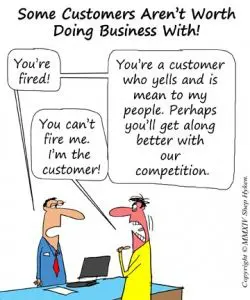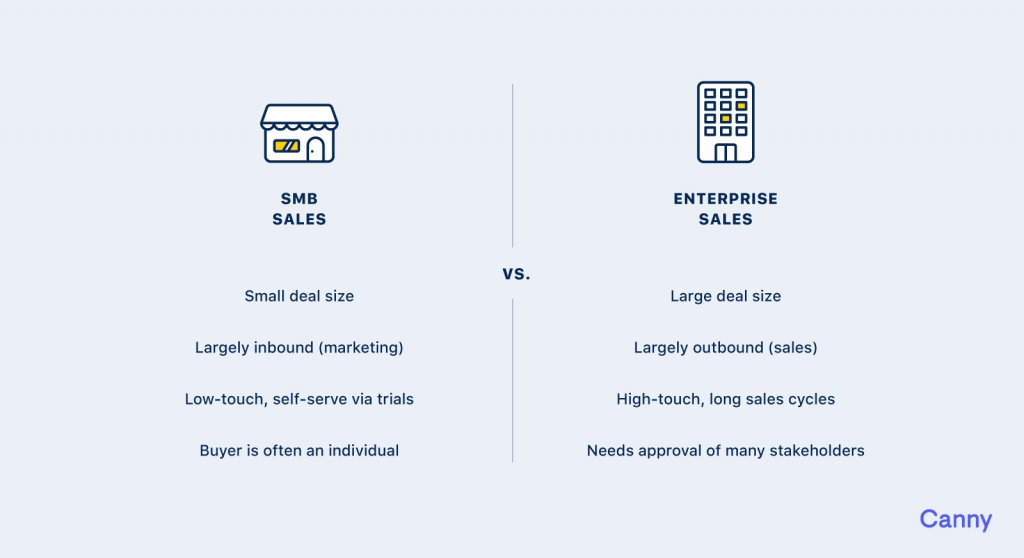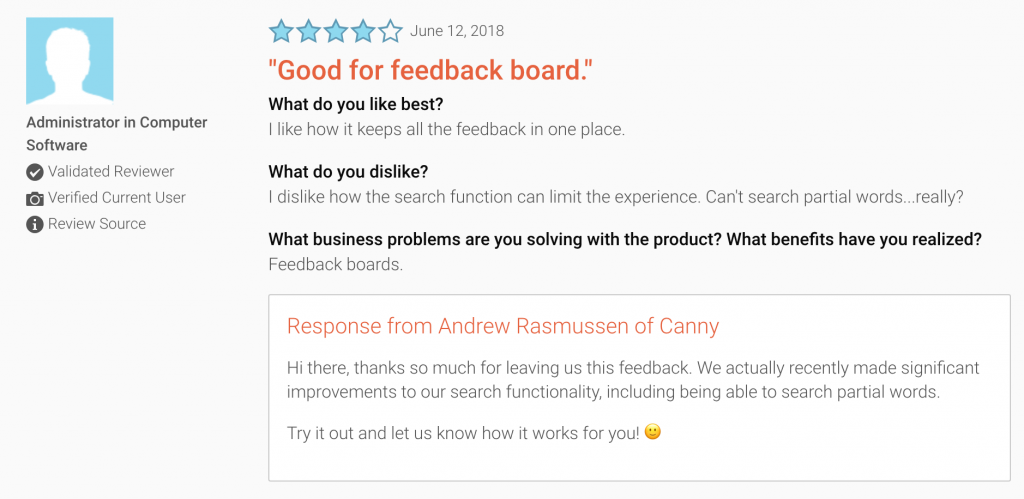Most companies are terrified at the idea of “not listening to customers”.
Feeling unappreciated is a major reason customers switch away from products and services. According to Salesforce, 66% of customers would leave a brand that didn’t appreciate them.
However, being grateful for feedback doesn’t mean you should always treat it the same.
Everyone’s heard stories of horrible customer support. What we talk about a lot less, especially in SaaS, is stories about horrible customers.
While 99.9% of people are an absolute joy to work with, there’s the 0.1% who behave in a less than desirable way. Some types of customers’ feedback does not come from a good place.
Respect and appreciation is important, but it should apply to both sides. And it’s perfectly fine to be firm about it.

Today, we’re going to talk about 3 types of “bad” customers whose sh*t you don’t need to deal with.
We’ve also included templates on how to reply to their “feedback” with integrity, respect, and balance.
A disclaimer about “bad” customers
Before we get into it, it’s important to make a distinction between a “bad customer” and a “bad person”.
Yes, some people are genuinely just jerks. Such is life.
However, more often than not, a “bad customer” isn’t actually a bad person.
They’re probably having a crappy day, a hard time, or are under a lot of pressure.

If you think of a difficult customer as just a bad person, you’ll get angry and resentful. This doesn’t solve anything, for you nor your customer.
A bad day doesn’t justify anything, and it definitely doesn’t mean you should just take it as is.
However, understanding that there’s a reason behind acting a certain way can help. You know that it has nothing to do with you.
It’ll help you keep your calm, and show integrity and respect even if they’re not.
That being said, let’s get into it.
Disrespectful/mean customers
These people are one of the worst kind of “bad” customers to deal with.
Whether they’re just being extremely condescending, or straight up calling you names, it’s not cool.

Even if you did do something wrong, resorting to insults is never acceptable. With some customers, it only happens once. With some, it’s a constant issue.
With a one time thing, you can offer to solve the issue—given that they adjust their behavior.
If it’s a recurring issue with the same customer even after asking them to stop…
Well, sometimes it’s better to end that relationship altogether.

We all think customer support representatives should have thick skin. It’s also hard to accept losing money over “firing” a customer.
However, nobody deserves to be bullied or degraded. Every issue in life can be resolved in a civilized way, no matter the severity of it.
How to respond
The key is to empathize first, offer a solution, and then firmly state that respect is expected.
An example of a one-time occurrence:
Thank you for your feedback! We understand your point of view, and apologize for any inconvenience.
Here’s how we can solve the issue you’re having:
- Solution X
- Solution Y
With that being said, though we empathize with your frustration, we ask you to communicate your concerns with respect.
We can solve this while remaining polite on both sides. We’re here to help.
An example of a regular occurrence:
Thank you for your feedback!
We understand your concerns and would love to make things right.
However, we feel like you’ve been incredibly disrespectful towards our team, and are continuing to do so.
This is not to imply that your dissatisfaction as such is unwarranted. However, it can and should be communicated in a polite way.
There are two ways we can move on:
1. We can agree to show respect towards each other and talk about the issue in a civilized way
2. If not, we can cancel your account/refund you, and you can find another solution
Let us know how you would like to proceed.
Big fish demanding special treatment
Even if big companies aren’t your target market, you’ll probably deal with one wanting to come on board at some point.
Big company offers can be tempting, and it’s hard to say no to these amazing deals. Doubling your revenue with one deal? Heck yeah!
There are benefits in selling to enterprises. Namely, they pay more and they churn less.

However, big companies have big company needs. If a big company is nice and patient about this, there’s no reason to not work with them.
However, some of them present their demands in an extremely condescending way.
Here are some red flag statements:
- “We’re paying you x times more than your regular customer, so you need to do x, y and z.”
- You’re such a small team, it should be easy for you to do x, y, or z for us.”
- “Don’t you want to say that a company like us is your customer? Well, then do x, y, and z.”
Basically—”we’re bigger than you, do what we tell you to.”
Many representatives of these big companies are used to getting whatever they ask for. I mean, they’re, like, Facebook. How can you say no.

If you take these threats and do whatever they demand, they’ll never stop asking.
If they never stop asking, you’ll be spending all of your time on them and their demands. The majority of your customers will be losing out.
How to respond
The key is to clearly (and respectfully) communicate that you don’t put edge cases first at the expense of your regular customers. Them not coming on board because of it sounds like a them problem.
An example of a response:
Thank you for your feedback!
We’ve decided we’re currently unable to prioritize features X and Y.
We’re a small team and have to be careful with how we spend our time. These features would add no value to the majority of our existing customers.
We understand that this is likely a deal breaker for you, but let us know if you’re still interested in moving forward.
Otherwise, feel free to look at some of the following companies who might be more suited to your corporate needs: X, Y, and Z.
Using public shaming as a threat
- 86% of millennials say they are influenced by negative reviews when purchasing a product or service.
- 84% of people trust reviews they read online as much as personal recommendations.
- 72% of customers don’t take action until they have read reviews.
These are all scary stats. Most companies view bad online reviews as a horrible thing. Everyone can see it, and it will cost any business customers and money.
And that’s precisely why certain customers love to use “public shaming” as a threat.
- “If you don’t do x, y, or z, I’m going to post on social media and tell everyone how badly you treat your customers.”
- “I’m going to give you a one star rating on X review site for doing this.”
These statements are just a way to try to blackmail you, on the premise of “ruining your reputation”.
However….
- 95% of consumers get suspicious of fake reviews if there are no bad scores.
- 68% of customers trust reviews more when they see a mix of good and bad reviews.
- 72% of B2B buyers say negative reviews give depth and insight into a product.
You shouldn’t be scared of negative reviews. You just need to learn how to deal with it well.
You definitely shouldn’t tolerate bad reviews being used as a threat to get you to do something. Especially if that something is something you have solid reasons for not doing.
So they want to go and say bad stuff about your company online? OK.
Most of the times, it’s just a threat anyway. Even if it isn’t, you can always reply to it in a friendly, useful, constructive way.

If anything, you’ll be letting everyone know how good you are at dealing with negative feedback.
How to respond
First, offer a workaround or other potential solution to whatever issue they’re having. Then, let the customer know that their threat of “public shaming” doesn’t phase you. They’re welcome to do so if they wish.
An example of a response:
Thank you for your feedback!
We’re sorry you’re not satisfied with our response. However, we are still unable to work on/prioritize/do X, Y, or Z for you at this time.
Here are some alternative solutions/workarounds that might help:
- Solution X
- Solution Y
If you wish to voice your concerns outside of our chats, you’re welcome to do so. We believe in freedom of speech, and you’re allowed to express yourself in any way you’d like.
Please let us know if there’s anything else we can do for you.
Don’t allow yourself to be beaten down
Yes, customer is king. However, that’s only the case if they’re respectful, honest, and genuine—like a king should be.
You should always strive to solve issues and work towards doing what your customers need.
However, that doesn’t mean bending backwards for customers who threaten, blackmail, and abuse you.
Every request, issue, and concern can be communicated in a respectful way. Sometimes, not listening to customers until they’ve adjusted their behavior is perfectly fine.
There’s nothing wrong about being firm and fearless about your integrity and your team’s well-being.
What are the worst “bad” customer stories you have? How did you deal with it?






